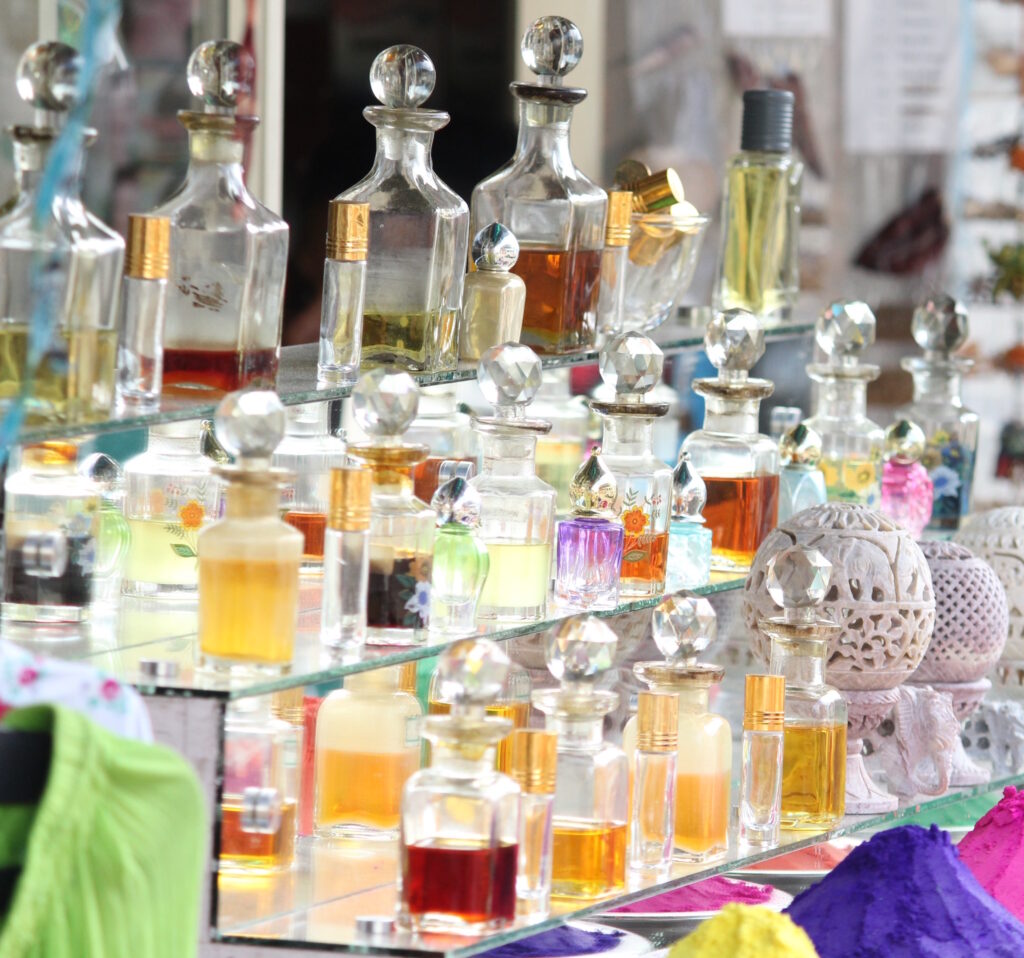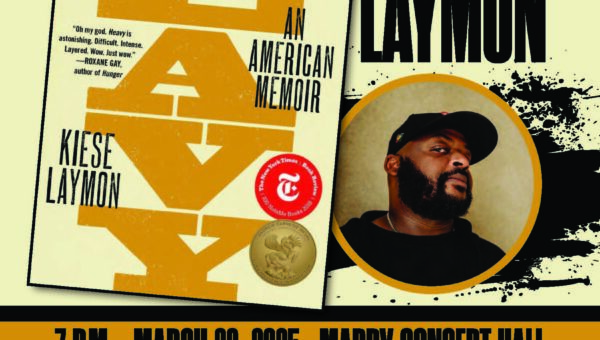Can perfume lovers and the scent-averse (those with allergies, chemical sensitivities, or just not fans) coexist in shared, public spaces? I am the person who nearly choked in college when Miss Rue, my elderly neighbor I drove to the store for cigarettes, pulled out a bottle of Estée Lauder’s Pleasures and proceeded to apply four or five sprays inside my small Geo Prizm. The smell clung to my car interior all winter. I am also the person who wore vintage Tabac Blond to my husband’s firm’s holiday party like armor—a smoky, boozy leather as if Marlene Dietrich had one drink too many and started a bar fight. I realize these are extremes, but is there a happy medium?
I love perfume and want to wear it. But in my readings, I’ve been disturbed on an existential level by bloggers on both sides. When activists for those with chemical sensitivities call themselves “canaries in the coal mine,” I can’t help but think they’re being precious, even verging on some of the same rhetoric of bodily purity that informs the arguments of anti-vaxxers. When they call fragrance “the new secondhand smoke,” I have a panic attack and calm myself by huffing the filthy floral of vintage Dioressence.
On the other hand, I’m not unsympathetic. As the parent of a child with severe allergies (to eggs and peanuts, not perfume), I believe that we have a responsibility to the vulnerable among us. And I suffer from occasional migraines, and know how smell can make them worse. If I feel one coming on, I can refrain from perfume for that day. But I can’t know who around me is suffering when I spritz.
At the same time, some of my most beloved perfume writers make me flinch. While I might be amused by perfume blogger and author Denyse Beaulieu archly observing “it is a well-documented fact that entire populations were wiped out by pruritus after having dabbed on a drop of Joy” (The Perfume Lover, 171), I’m not sure I agree when perfume critic Luca Turin calls legislation regulating fragrance “puritanical,” and I outright cringe when Turin and Sanchez, in the intro to their Perfume: A—Z, pronounce: “Headaches, however, are not allergic (i.e., immune) reactions…. If you’d like to overcome a general oversensitivity about perfumes, the best cure is to find perfumes you like and to let them teach you to enjoy smelling beautiful things. If instead you’d rather demand that the world be utterly scent-free, you’re a drag” (48).
So how did we get to this point? And what does this conflict say about us?
History
People once experienced a much broader range of smells, both good and bad, on a daily basis: unwashed bodies, baking bread, emptied chamber pots, animals, wood fires, all the rural smells from manual labor on farms to the urban smells of bodies working and living in close proximity. It’s the modern attempt to erase or neutralize smell that’s the outlier. And even that non-smell has a smell, as Diane Ackerman notes in A Natural History of the Senses: “Even so-called unscented products are, in fact, scented to mask the chemical odors of their ingredients, usually with a light musk. In fact, only 20 percent of the perfume industry’s income comes from making perfumes to wear; the other 80 percent comes from perfuming the objects in our lives” (39). Despite a large market for Bath & Body Works, Yankee Candle, Lush’s bath bombs, and endless choices of scent for cleaning products and detergents, women in public are afraid to smell very strongly of anything in particular. Blandness has reigned since the ’90s, a period Turin calls “anorexic” in its obsession with cleanliness, and scents inspired by water, by nothing—L’Eau d’Issey the quintessential “office scent,” whose entire purpose is to avoid being offensive, scents meant to blend in.
The International Fragrance Association (IFRA) was established in 1973 to regulate its members, a compromise struck so they can monitor while preserving trade secret formulas. While this self-policing makes sensitivity activists suspicious, the organization has not been shy in its directives, which target some of the biggest houses in the industry. Some ingredients are excluded for environmental sensitivity or animal cruelty purposes, yet others, despite centuries of use, are banned because a small segment experiences skin reactions. Barbara Herman describes recent decrees that may irreparably damage some of the greatest scents: “By January 2010, IFRA had instituted a ban on a long list of perfume ingredients crucial to iconic perfumes such as Chanel No. 5, Joy, and Mitsouko. This prompted Paris-based perfume historian Octavian Coifan to declare that ‘twentieth-century perfumery will become history.’ The situation is looking even more dire now. At the time of this writing, in 2013, the EU is proposing severer restrictions on even more natural ingredients used in perfumery, to which Frédéric Malle…has responded, ‘If this law goes ahead, I am finished, as my perfumes are all filled with these ingredients’” (Scent & Subversion, 4). Are regulators overreacting? While concerns about using materials that require confining and scraping civet cats or plundering stressed sandalwood growth are understandable, in many cases, substances used for centuries are being restricted or banned preemptively. Blogger Denyse Beaulieu condenses the issue for us: “our society has given in to the zero-risk mentality. To decision-makers, whether corporate or institutional, public safety—and avoiding lawsuits—will always trump aesthetic achievement or cultural heritage” (TPL, 173). Guerlain hopes to preserve cultural heritage by lobbying the French government to exempt it from regulation so their original formulas can be restored. But this exemption would only apply to small quantities of their iconic perfumes, and would only be available to the wealthy or to those who can travel to their Paris museum to sniff them. Does this reserve the portable art of perfume only for the privileged, making the accessibility of beauty less democratic? Or does it liberate the public from the imposition of potential allergens?
Crowdsourcing the Question
I want to believe perfume lovers and the scent-averse or allergic can coexist in public spaces. I don’t wear perfume on a plane or in a space where I know people are sensitive because I’m not an asshole. But do I cause pain just in passing? I took to social media to ask my friends and acquaintances. They responded—immediately, enthusiastically, vehemently—with their own reactions, but also with thoughtful answers to my followup questions. While several of them enjoy a bit of perfume, most objected to being assaulted with too much scent by careless wearers. One dear friend confessed to not liking my perfume—that she wanted to love it because she loves me, but occasionally found me too fragrant. Several claimed sensitivities ranging from headaches or coughing to asthma attacks and other autoimmune reactions. Their comments helped me clarify the issues of fragrance in public spaces, and their arguments largely break down as follows: 1. the quantity or strength of the scent (subjective, but valid); 2. the personal preference/taste/aesthetic regarding others’ choice of scent (subjective, but is it valid?); 3. the health and safety of those in proximity to fragrance (objective); and 4. the issue of natural versus synthetic fragrance (a gray area).
Quantity/Strength
On the first point, there was wide agreement on the social courtesy that people shouldn’t wear perfume in enclosed spaces with others—there’s a special place in hell for those who spritz in airplanes—and in general people shouldn’t go overboard with fragrance in public. OK, agreed. But how much is too much? Consensus suggests perfume should hover immediately above the skin—“kissing distance” because “the whole purpose is to entice someone in closer”—though some love catching a wave of scent off someone, what’s called sillage, a term for the wake left by a ship. Several bring up those ladies of a certain age who a) wear the stronger iconic perfumes of the past, and b) have become anosmic to them, so they load on the scent. Others point out that unlike other adornments like makeup or shoes, perfume doesn’t stay on the user’s body, and that people often have no sense of how much scent they’ve applied: “People think they can judge for themselves how much is too much—but where and for whom?” I know I’m guilty of this. Just a few weeks ago, I found an old, used bottle of Estée Lauder’s Azurée and bought it, unsniffed, on the basis of its cult reputation. I spritzed the tiniest bit on one wrist to sample it—an earthy leather chypre that smells like a hippie’s suede bag after a long road trip—then went about the rest of my errands. At the post office, the woman working the counter asked what she smelled. It was me, my wrist under and across the desk from her. Fortunately, she enjoyed it, said it took her back to the seventies, but I had no idea my perfume was projecting that far. So the quantity/strength issue is valid, though the question of how much is too much is less clear—some scents require a lighter hand, but for other people, no amount is going to be tolerable.
Aesthetic Taste
The second point, the issue of personal taste, is more interesting. As my friend Karen puts it, “Strong fragrance forces everyone to smell something they may not have chosen on their own. It’s like when you go to the beach and someone sets up next to you with a radio on a station you’d never choose. It’s hard to get away.” I laugh when I read this, because the philosopher Immanuel Kant agreed with her from way back in the eighteenth century: “Others are forced, willy-nilly, to participate in this pleasure. And this is why, being in contradiction with freedom, olfaction is less social than taste, where among many dishes or bottles a guest can choose one that he likes without others being forced to share the pleasure of it.” But Karen’s comparison to sound is interesting—we govern how loud sound in shared spaces can be, but we don’t ban it completely, and only require quiet in certain contexts, like classrooms, libraries, hospitals, and confined spaces like airplanes. Beyond that, we’re negotiating with courtesy. We express ourselves and our tastes in what we wear every day—clothing, perfume, accessories. Not everyone will appreciate our choices. In the comment threads, we talk about particularly noisome perfumes: the scents of the Big Eighties like Giorgio and Poison, the awful Axe body spray. There are also disagreements as people name hated fragrances and others defend those same scents. But for some people, perfume is more than an accessory—as Barbara Herman puts it, “it is personal memory, cultural history, and art” (S&S, 4). So when we’re talking about aesthetics, are we only talking about taste in commodities, or about perfume as portable art? Certainly, it’s been acknowledged as art by the French government and by the Museum of Art and Design. Is it all right for art to offend?
Health and Safety
Offend sensibilities, perhaps, but airways? People suffer allergic or autoimmune reactions to inhaled particles, including perfume—these are objectively serious (asthma attacks or worse), and I have nothing to add, so I’m mostly going to focus on sensitivity. Many others self-report sensitivities that cause cough, headache, or even migraines. The world is full of volatile organic compounds (VOCs), so how much extra harm do we add with personal perfume use? Is perfume getting scapegoated, given the prevalence of molecules in the air like exhaust and other particulates? Even when limited to scented objects, the environment is far from clean and odorless: clean, in fact, usually means odor-filled, with pine or lemon or mint or white musk as white noise. And a recent San Francisco Chronicle story cites a study finding that scenting our surroundings contributes as much to smog as cars (https://www.sfchronicle.com/news/article/Fragranced-products-to-blame-for-smog-as-much-as-12618108.php).
Is sensitivity caused by the prevalence of scent? Or by the attempts to remove it from the environment, in the same way that our obsession with cleanliness has led to a rise in superbacteria and peanut allergies? As I noted earlier, 80 percent of the fragrance market is devoted to objects other than perfume—are we targeting the 20 percent because it’s low-hanging fruit? If we got rid of the other 80 percent, would the remaining 20 be more tolerable, even enjoyable?
As an exercise, I made a list of scented things I use, part of that 80 percent that are not explicitly perfume in my everyday environment:
-Aveda cleanser and lotion, both scented with their organic natural signature “Pure-fume,” which smells faintly like geranium and rose
-Rosewater spray
-Aveda shampoo and conditioner, also scented with Pure-fume soap—varies in scent. I like and tend to accumulate foofy soaps, as a reward for running. Right now, it’s a vetiver scent.
-Occasionally I use J.R. Watkins’ 97% natural bodywash, Coriander and Cedar scents
-Jergen’s lotion
-Dove deodorant, Cucumber-Green Tea scent
-Oil of Olay, unscented
-makeup, mostly unscented, though a few have faint smells of wax, chocolate, mint, etc.
-Aveda hair styling products, scented with Pure-fume
-Colgate toothpaste, peppermint
-Aveda hand lotion, which smells sort of orangey
-Burt’s Bees lip balm, peppermint and honey
-J.R. Watkins’ dishsoap, lemon
-Seventh Generation handsoap, “0% synthetic fragrance,” Mandarin and Grapefruit scent
-Clothes washed in unscented Seventh Generation detergent, though many of my clothes carry ghosts of perfumes past
**This list contains several unscented items, mostly because I don’t want my products to compete with my perfume. It also doesn’t account for if I’m housecleaning, when I tend to use Method products—I’m especially fond of their Grapefruit scent.
My friends with sensitivities agree that it’s difficult to locate products that are truly fragrance-free. Many self-select, avoiding people or places that are too heavily scented—is that an acceptable compromise, one we can expect the sensitive to make? Should they have to? What social obligations exist in a public space? Aside from allergic and autoimmune reactions, how sensitive is sensitive? Assuming perfume lovers want to wear it without causing unreasonable discomfort, where’s the line—fragrance is unacceptable if it causes nausea? migraine? headache? intense dislike? annoyance? distraction? Is there a line?
What about those whose health is helped by scent? Historically, fragrance was used for fumigation: both physical, during various plagues, and spiritual, in the form of incense. Today, fumigation with or application of essential oils has shown significant promise against infections and for pain relief (https://www.theatlantic.com/health/archive/2015/01/the-new-antibiotics-might-be-essential-oils/384247/?utm_source=atlfb). Essential oil therapies also seem to help those with autism to focus. Scent aids mental health, easing anxiety and depression, providing a sort of social armor. Earlier, I described wearing Tabac Blond to my husband’s work event to gird myself for social interaction; there are days I can’t bear public encounters without some costume of scent. In fact, a woman without a sense of smell considered it a disability, declaring in Newsweek “I am handicapped: one of 2 million Americans who suffer from anosmia, an inability to smell or taste” (“My Turn” column, 3/21/88).
Those who suffer from sensitivities use strong language to describe their situation, calling scent a form of assault, that perfume is the new secondhand smoke for public health. They see themselves as the canaries in the environmental coal mine. This seems alarmist, but I don’t want to dismiss these concerns out of hand defensively. Are there people who serve as barometers for environmental pollution? Is it a mantle that makes those suffering feel more special or heroic? Is perfume like secondhand smoke? The latter threat was tested at levels that bystanders breathed. One friend sends a link to a list of chemicals in fragrances to prove their toxicity (http://scentsense.com.au/node/16), which I read carefully, and she’s right, the ingredients are toxic—if sprayed in the eyes or swallowed. Point taken.
Natural versus Synthetic
Which brings me to my final point: Is this essentially an argument about chemicals? About synthetic versus natural? I ask those on the comment thread whether essential oils or vintage perfumes with few or no synthetics are acceptable. Some say yes, with one replying “Honestly, I’d rather smell a fart sometimes. At least it’s organic.” Others say scents like lavender or rose affect them, regardless of source. Another notes that lots of dangerous things like hemlock and arsenic are 100% natural.
Is objection a form of anxiety about bodily purity—that to smell, molecules actually have to enter your body? Perfumer and perfume writer Mandy Aftel explains that “In order for you to perceive a distinct smell, some volatile constituent of the odiferous substance must vaporize, waft deep into your nose, and settle on your olfactory receptors” (Fragrant, 11). Christophe Laudemiel adds, “Scent goes inside you because you have to breathe and because it’s made of molecules” (qtd in Herman S&S, 12). Humans, especially in this country, have a deep anxiety about bodily purity, especially in the upper classes where preoccupations with clean food and anti-vaccination movements are breeding, buying “raw water” cleaned of chemicals like chlorine and fluoride (though not of giardia). Thus, any inhaled molecule is felt as an invasion—are the scented ones blamed because they’re more noticeable? And scent will trigger some sufferers, regardless of its source—even if natural, they may read it as chemical and react. Does that make it psychosomatic? And does it matter? My mother and my friend who both have worked for hospice say no; pain is whatever the patient says it is.
My Rights, Your Rights
In this “Me, Too” moment, we need to acknowledge that it is not right to force a situation on someone who doesn’t enjoy or want it. How far do we go in regulating that?
We return to Kant, who viewed the aesthetics of fragrance as an issue of freedom. This conflict, like most social conflicts in our country, seems to boil down to “freedom from” versus “freedom to,” that tricky balance that governs most discussions of individual rights.
Part of me rebels against what feels like policing of (mainly women’s) bodies. Part of me agrees with perfume writer and blogger Alyssa Harad when she says, “I think [a woman] should have the right, on occasion, to move in extravagant clouds of her own making…. The right, when she wants it, to take up some space” (Coming to My Senses, 234). Is perfume a feminine pushback against manspreading, to take up olfactory space? I sympathize deeply with the anxiety of one of my commenters who, as the result of an abusive relationship, had developed anorexia, upset that in addition to everything else “my scent was now something I needed to control as tightly as I had been controlling the rest of my body. That in addition to needing to be smaller, laugh smaller—I had to smell smaller.” Yet I know this is privilege—to take up or colonize air space, even invade someone else’s.
Any resolution?
I was struck by the comment of a friend who works in the wine industry, who is banned from wearing fragrance to work, but who loves it: “I empathize with those who have a physical sensitivity to scent. It seems there is also something else going on, though, which is a cultural inability to sit with discomfort. We are really bad at tolerating anything different or offensive, including smells. And there, we need to do some work.”
I sincerely hope that perfumes won’t be outright banned, the way they are in Halifax, Nova Scotia. I think the world would be smaller and less beautiful. The very thought of it makes me want to hoard more Mitsouko, though I own more bottles than I will wear in a lifetime. But if perfume lovers want to share public space, we have to be sensitive to those with sensitivities. In short, don’t be an asshole. Be aware of the spaces you will spend time in. When you wear fragrance, know which require a light touch, and try to keep within the suggested kissing distance. Be open: encourage people to let you know if it’s bothering them; believe them, and adjust accordingly. Feel free to scent-bomb your own living space.
In an ironic turn of events, I’m writing this piece after a long bout with the flu and its fun microbial followups: sinus and ear infection, bronchitis. For the past two weeks, I haven’t felt like wearing perfume. Hell, I haven’t felt like wearing pants. I do miss it, though. Just before I succumbed, I got a delivery of a restock of Vol de Nuit, and a clearance-sale bottle of L’Artisan’s Safran Troublant, a saffron-rose scent I discovered just on the verge of being discontinued. I’ve been looking forward to wearing both, but as it is, I can barely breathe, let alone smell. When I finally don pants and a sweater to go pick up the antibiotics my doctor phoned in, I notice my sleeves still smell of Azurée, the scent I tested two weeks ago, the one the postal worker enjoyed from across her desk. I sniff deeply. The sharp leather scent is gorgeous. And it makes my currently hairtrigger respiratory system cough. I recognize that this reaction may be the same many people experience every day. And yet, god help me, as I re-sniff my sleeve I can’t wait for the antibiotics to take effect so I can spray myself with scent again. Lightly.
ABOUT THE AUTHOR
Heidi Czerwiec is the author of the lyric essay collection Fluid States, selected by Dinty W. Moore as the winner of Pleiades Press’ 2018 Robert C. Jones Prize, and of the poetry collection Conjoining. She holds an MFA from UNC-Greensboro and a PhD from the University of Utah. She was a professor for twelve years before moving to Minneapolis, where she is an editor for Poetry City, USA and Assay: A Journal of Nonfiction Studies. Heidi mentors with the Minnesota Prison Writing Workshop. Visit her at heidiczerwiec.com.





